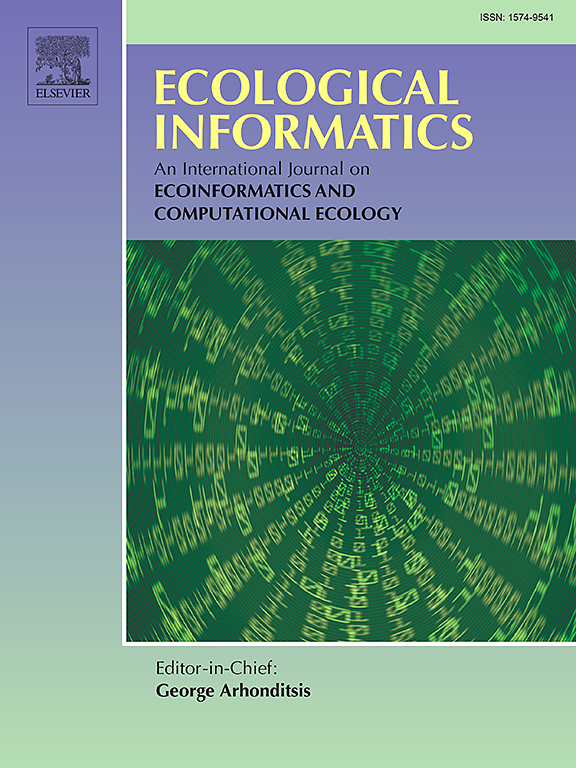基于广义加权方案的鲁棒加权AMMI建模方法
IF 5.8
2区 环境科学与生态学
Q1 ECOLOGY
引用次数: 0
摘要
在作物改良育种中,AMMI模型及其变异被广泛用于鉴定对环境条件具有特定适应性和稳定性的基因型。然而,由于测量误差、基因型特征、疾病或气候现象而产生的非典型数据点可能会导致违反其基本假设,从而严重影响模型的性能。为了应对这一挑战,我们提出了一种称为鲁棒加权AMMI (RW-AMMI)的混合建模框架,该框架结合了鲁棒和加权算法,可以在数据污染和异方差存在的情况下有效地模拟基因型-环境相互作用(GEI)。我们还为加权(W-AMMI)、鲁棒(R-AMMI)和RW-AMMI模型介绍了一套全面的九种加权方案。我们广泛的蒙特卡罗模拟,包括污染和未污染的数据,有和没有异构误差方差,证明了W-AMMI, R-AMMI和RW-AMMI类中的几个模型相对于传统的AMMI模型具有竞争力。此外,我们使用实际作物数据验证了所提出方法的有效性,其中我们利用集成策略来增强基因型推荐,为其适用性提供了实际证据。本研究为不同环境条件下的基因型选择提供了一个杂交框架,为育种者提高稳定性和适应性提供了可靠的工具。本文章由计算机程序翻译,如有差异,请以英文原文为准。
A robust-weighted AMMI modeling approach with generalized weighting schemes
The additive main effects and multiplicative interaction (AMMI) model and its variations are widely used to identify genotypes with specific adaptability and stability under environmental conditions in crop improvement breeding programs. However, atypical data points, arising from measurement errors, genotype characteristics, diseases, or climate phenomena, can significantly impact the model’s performance, by contributing to the violation of its underlying assumptions. To address this challenge, we propose a hybrid modeling framework called robust-weighted AMMI (RW-AMMI), which combines robust and weighted algorithms to effectively model genotype-by-environment interaction (GEI) in the presence of data contamination and heteroscedasticity. We also introduce a comprehensive set of nine weighting schemes for the weighted (W-AMMI), robust (R-AMMI), and RW-AMMI models. Our extensive Monte Carlo simulations, which encompass both contaminated and uncontaminated data with and without heterogeneous error variance, demonstrate that several models within the W-AMMI, R-AMMI, and RW-AMMI classes perform competitively relative to the conventional AMMI model. Furthermore, we validate the effectiveness of the proposed approach using real crop data, where we leverage ensemble strategies to enhance genotype recommendations, providing practical evidence of its applicability. This work provides a hybrid framework for genotype selection under diverse environmental conditions, offering breeders a reliable tool for improving stability and adaptability.
求助全文
通过发布文献求助,成功后即可免费获取论文全文。
去求助
来源期刊

Ecological Informatics
环境科学-生态学
CiteScore
8.30
自引率
11.80%
发文量
346
审稿时长
46 days
期刊介绍:
The journal Ecological Informatics is devoted to the publication of high quality, peer-reviewed articles on all aspects of computational ecology, data science and biogeography. The scope of the journal takes into account the data-intensive nature of ecology, the growing capacity of information technology to access, harness and leverage complex data as well as the critical need for informing sustainable management in view of global environmental and climate change.
The nature of the journal is interdisciplinary at the crossover between ecology and informatics. It focuses on novel concepts and techniques for image- and genome-based monitoring and interpretation, sensor- and multimedia-based data acquisition, internet-based data archiving and sharing, data assimilation, modelling and prediction of ecological data.
 求助内容:
求助内容: 应助结果提醒方式:
应助结果提醒方式:


